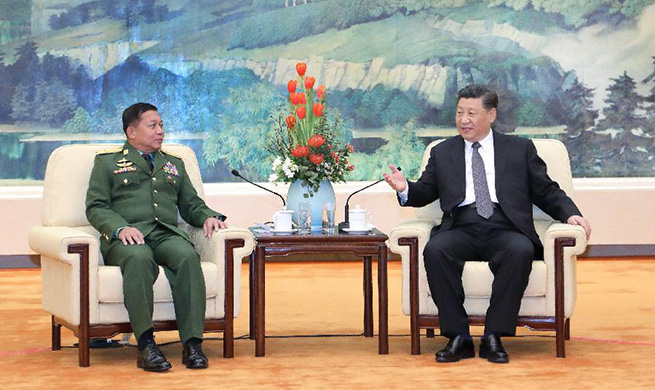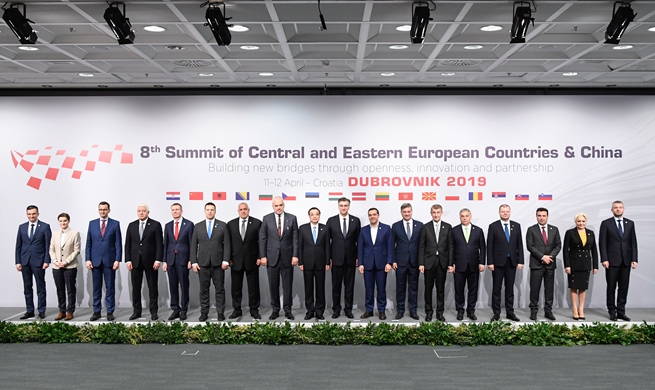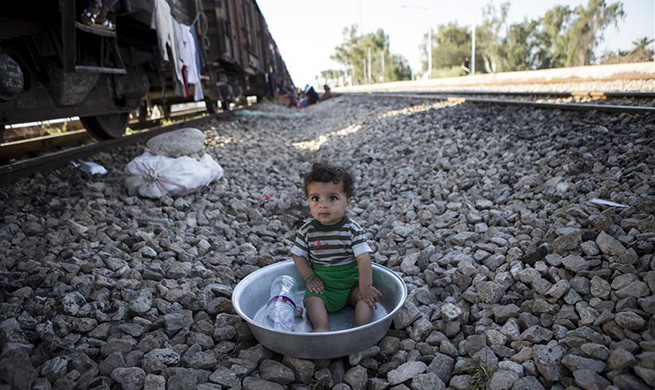by Mahmoud Fouly
CAIRO, April 13 (Xinhua) -- The favorable outlook for Egypt's economy under the ongoing reform program as highlighted in a recent report by the International Monetary Fund (IMF) indicates promising horizons and profitable opportunities for the country's economic future, said Egyptian economists.
The IMF said in its fourth review of the Egyptian economy, released earlier in April, that "the outlook remains favorable, provided policies agreed under the program are implemented."
"Growth is expected to strengthen further to about 6 percent over the medium term, assuming sustained implementation of reforms," it added.
Egypt started its three-year austerity-based economic reform plan in November 2016 by liberalizing the foreign currency exchange rate to contain U.S. dollar shortage. The reform is encouraged by a 12-billion-dollar loan from the IMF, 10 billion of which has already been delivered in five tranches.
PROMISING HORIZONS
"The IMF outlook for Egypt's economy is increasingly favorable as Egypt is implementing its economic reform program, which leads to further global confidence in the Egyptian economy," said Walid Gaballah, an economic and financial legislation expert.
Egypt's economic performance qualified it to represent Africa in the IMF-World Bank annual Spring Meetings as a strong emerging economy, he added.
"Egypt has already carried out more than 85 percent of the difficult measures of the program. The results have been expected to be better, but what has been achieved is a big success within the tightening of global economic conditions," the expert told Xinhua.
The IMF's report described Egypt's liberalization of the foreign exchange market as a "prudent monetary policy," noting that it was among the factors that helped stabilize the country's macroeconomic environment.
"The liberalization of the foreign exchange market made foreign currency available via legal channels in the banks and eliminated the black market, which is one of the reform program's fruits," Gaballah explained.
According to Gaballah, what has been achieved and what's expected to be accomplished under the reform program is "a big accomplishment given the current difficult global economic conditions."
The IMF's fourth review of Egypt's economy under the reform program stated that "the program is broadly on track."
"Egypt has preserved macroeconomic stability thanks to the authorities' sound policy implementation," said the report, noting that the GDP growth rose from 4.2 percent in the fiscal year 2016/17 to 5.3 percent in 2017/18, and that the unemployment rate marked its lowest since 2011.
Gaballah said most world economic and financial institutions testified to the success of Egypt's economic reform program and the IMF presents it as a success story of the fund's assistance to countries for successful economic transformation.
He said that Egypt is now in better conditions with the increasing revenues of tourism, the Suez Canal and the remittances of Egyptian expatriates, which contributed to a lower exchange rate of the dollar in Egypt.
"These are among the fruits of the economic reform program, yet we have some challenges to address such as the high investment startup costs and the social protection of those affected by the program's strict measures.
PRESSING CHALLENGES
Yomn al-Hamaki, an economics professor at Ain Shams University in Cairo, said the IMF's favorable outlook shows that "the Egyptian economy has very promising horizons and is full of profitable opportunities."
Despite the positive indications, the IMF's review raised some concerns and challenges related to the Egyptian economy, including the tightening of global financial conditions and heightened global risk aversion that contributed to a pullback by investors from emerging markets.
"The basic challenge is the decline of foreign direct investments," the professor told Xinhua.
She explained that the Central Bank of Egypt (CBE) is doing a good job in addressing this challenge through activating the role of the banking authorities in providing development-based credits focusing on productive sectors like industry and agriculture that increase the country's exportation opportunities.
Another main challenge is the country's debt, as foreign debt reached 93.1 billion dollars by the end of September 2018 and the domestic debt reached 3,887 trillion Egyptian pounds (224.6 billion dollars) in the same period, according to the CBE.
The total debt, both local and external, represents about 93 percent of the country's GDP and the IMF expects it to continue to decline to 86 percent of GDP by the end of the program and to about 71 percent of GDP by the fiscal year 2023/24.
Egypt's fiscal year runs from the beginning of July to the end of June.
"The Debt Sustainability Analysis indicates that Egypt's debt is sustainable, but is subject to significant risks," said the IMF's report, while CBE repeatedly reassures that it's within the safe limits.
Hamaki said among the basic challenges that Egypt needs to address are improving the investment environment, providing professional and predictive skilled workers to the labor market, improving rationalization of public expenditure and fighting corruption.
Egypt's reform program includes fuel and energy subsidy cuts that have led to price hikes over the past couple of years, but the government has allocated billions of Egyptian pounds in a social protection program for conditional and unconditional cash transfer to support those most affected by the subsidy cuts and consequent price hikes.
The professor noted that the IMF's report expected a little higher inflation rate because of the anticipated gas price hikes in July given the planned full subsidy cut as part of the program.
"With regards to electricity, the complete subsidy cut has been delayed until 2021, which is a positive change because it is difficult for the people to endure higher fuel and energy prices all together," Hamaki added.
Hamaki expressed her belief that economic empowerment of the poor is more effective than financial support in cash.
"I hope that the social protection network focuses more on economic empowerment of the poor through training them and engaging them in projects or providing them with productive jobs rather than giving them financial support in cash," she said.













